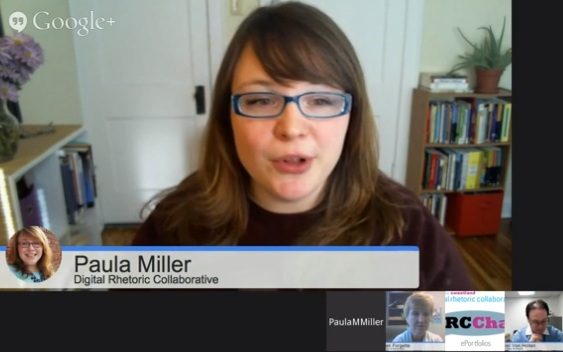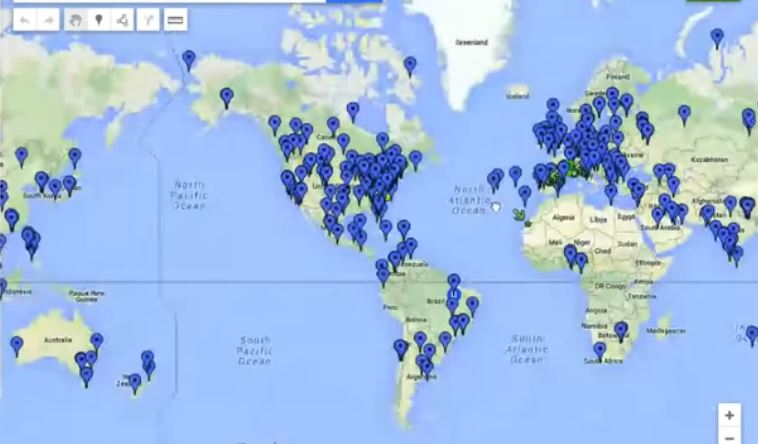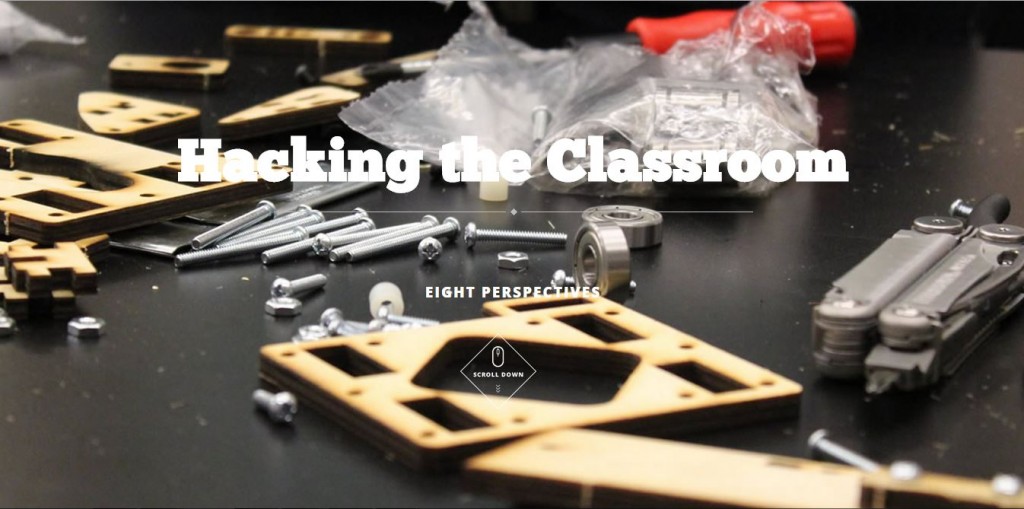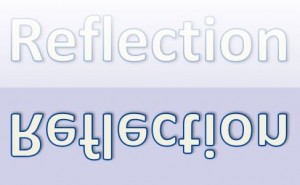 I’ve been thinking about reflection a lot lately both as a teacher in a portfolio-based classroom, in my e-portfolio research studies, and as a teacher new to the online classroom. In “Portfolio as Genre, Rhetoric as Reflection: Situating Selves, Literacies, and Knowledge,” Kathleen Blake Yancey reflects on the importance of reflection–to herself and to the student portfolio. Yancey identifies the reflection piece, where students talk “about what they’ve learned about their writing, and about their writing practices,” as that work that distinguishes a portfolio from a folder (56). Reflections can involve instability, with reflections sometimes being marked by uncertainty where writers aren’t sure why they made certain moves (56). In support of another instability, reflections are opportunities for writers to generate “multiple versions” of their identities and their texts (65). These reflections do not arise solely from the writer. Instead, we situate our reflections in a community; thus, “reflection offers writers the opportunity to tell multiple stories in multiple genres for others in community to hear, to respond to” (66). It is in this spirit that I reflect back on our recent examinations of online teaching.
I’ve been thinking about reflection a lot lately both as a teacher in a portfolio-based classroom, in my e-portfolio research studies, and as a teacher new to the online classroom. In “Portfolio as Genre, Rhetoric as Reflection: Situating Selves, Literacies, and Knowledge,” Kathleen Blake Yancey reflects on the importance of reflection–to herself and to the student portfolio. Yancey identifies the reflection piece, where students talk “about what they’ve learned about their writing, and about their writing practices,” as that work that distinguishes a portfolio from a folder (56). Reflections can involve instability, with reflections sometimes being marked by uncertainty where writers aren’t sure why they made certain moves (56). In support of another instability, reflections are opportunities for writers to generate “multiple versions” of their identities and their texts (65). These reflections do not arise solely from the writer. Instead, we situate our reflections in a community; thus, “reflection offers writers the opportunity to tell multiple stories in multiple genres for others in community to hear, to respond to” (66). It is in this spirit that I reflect back on our recent examinations of online teaching.
This reflection includes links to the multiple stories we’ve recently been telling in multiple genres and we invite you not just to hear, but to respond to our conversations about online writing instruction.
Chatting about ePortfolios
Portfolio reflection came up as one of the topics related to ePortfolios when DRC Fellows Paula Miller and Jenae Cohn held an On-Air chat about e-portfolios with Kate Birdsall, Assistant Professor in the Department of Writing, Rhetoric, & American Cultures at Michigan State University, Daniel Von Holten, Instructor specializing in professional and workplace writing at Kansas State University, and Karen Forgette, WRIT100 Core Instructor at ePortfolio Committee member at The University of Mississippi. These experienced instructors also offered advice about gaining student buy-in on the portfolio experience and incorporating reflection throughout the course.

DRC Chat – Hanging out with the Ohio State MOOC Team
In another Hangout on Air chat, we got a big picture view of digital composition and online teaching when Paula Miller talked with the Ohio State Rhetorical Writing II MOOC Team. Professors Cynthia Selfe, Scott Lloyd DeWitt, Ben McCorkle, Kay Halasek, Susan Delagrange and PhD students Chad Iwertz and Mike Blancato reflected on MOOCs after successful iteration of their Rhetorical Writing II MOOC class. They explored questions related to writing taught at scale, what transfers from face-to-face classroom pedagogy into a MOOC writing class, how teaching and learning might happen in digital environments, and many others.

Perspectives, Challenges, and Strategies for Teaching Online
We examined online writing and e-portfolios back in December with a Twitter chat on “Education in the Cloud – Perspectives, Challenges, & Strategies for Teaching Online.” Online instructors shared with us their perspectives on
- building relationships with students online,
- how online tools can build face-to-face teaching,
- affordances of online teaching, and
- teaching philosophy changes resulting from online instruction.

Our January Webtext of the Month featured “Hacking the Classroom: Eight Perspectives,” an examination by eight authors – ranging from emerging practitioners, established scholars, and even an undergraduate student—of “hacking” composition. In her review, DRC Fellow Jenae Cohn notes that the webtext provoked her to see “hacking” composition as not “just re-building,” but also “actively resisting stagnation in our own and our students’ ways of looking at composing in the 21st century.”
As a teacher recently arrived in online writing instruction, I’ve reflected in the Reflections from the Trenches in the Cloud series about:
- resources that benefit instructors and students in online writing courses,
- how my pedagogy had developed in teaching online, or, the post-classroom writing class,
- the significant temporal differences between teaching online and face-to-face
Online Writing Instruction Considerations beyond the FYW Program
 We also have examined ways that online writing instruction affects other institutional services and structures. In Reflections from the Trenches in the Cloud: Online Writing Centers, Paula Miller looked at how writing centers work online with support for both synchronous and asychronous sessions, and offers suggested resources for supporting online writing centers.
We also have examined ways that online writing instruction affects other institutional services and structures. In Reflections from the Trenches in the Cloud: Online Writing Centers, Paula Miller looked at how writing centers work online with support for both synchronous and asychronous sessions, and offers suggested resources for supporting online writing centers.
 In To Google and Beyond: Instructors and Librarians as Teaching Partners in Online Writing Classes, Jenny Dale, Coordinator of First-Year Programs, UNC Greensboro University Libraries, examined ways that librarians work with online college writing courses and how instructors can work with librarians to support online instruction. When face-to-face courses have long included library instruction, what does that instruction look like in an online course?
In To Google and Beyond: Instructors and Librarians as Teaching Partners in Online Writing Classes, Jenny Dale, Coordinator of First-Year Programs, UNC Greensboro University Libraries, examined ways that librarians work with online college writing courses and how instructors can work with librarians to support online instruction. When face-to-face courses have long included library instruction, what does that instruction look like in an online course?
Reflecting on Reflection

The power of reflection is that it’s not merely a looking back, but also a looking ahead. For me, like Yancey, the processes of reflection “help me see when I should stay the course or take a detour, enable me to see that perhaps I should change the directions I’ve set to suit the selves I seem to be becoming” (55).
This reflection is situated in a community of scholars and teachers interested in digital composition and online instruction. So I invite you to participate further in this reflection: Where do you see not just where we have been, but where we are going with online writing instruction? How does our face-to-face pedagogy shape our online writing instruction? How does our OWI shape our face-to-face and hybrid pedagogies? What are impacts beyond the college writing department, such as those to writing centers and libraries? What questions shape your inquiries regarding online writing instruction?
Works Cited
Yancey, Kathleen Blake. “Portfolio as Genre, Rhetoric as Reflection: Situating Selves, Literacies, and Knowledge.” WPA 19.3 (1996): 55-69.
